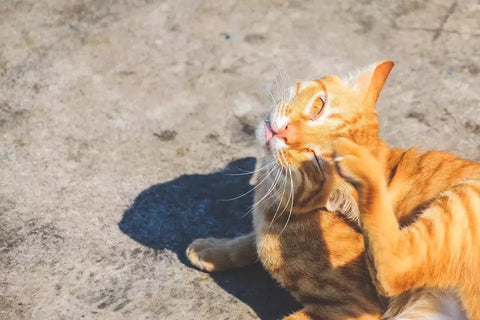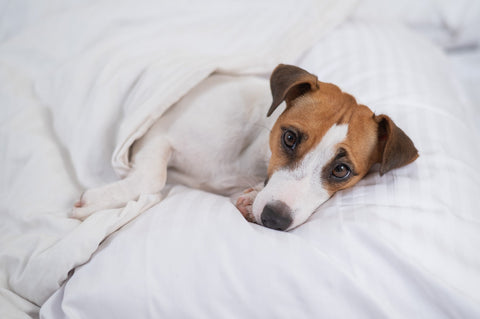A chunky pup can be a cute pup, but all those adorable rolls can affect your babies health. Obesity in dogs is considered a critical condition and can affect the way your pup lives her life.
Read on to find out what causes obesity, why it happens, its negative impacts to your fur-baby, and how you can get through this.
How do I know if my dog is obese?
Determining if your dog is obese depends on the breed. You know your dog best and you will be able to recognize that your dog is not in his normal weight anymore. Consult your vet as he will help you with the assessment. Your vet will provide you an estimated body weight to use for your dog's specific breed, age, health condition, activities, etc to ensure proper results.
"According to researchers, proper rest and sleep deprivation may lead to obesity as it can cause hormonal changes in your fur-baby which leads to an increased appetite."
The following can also be signs you can look for to know if your dog is obese:
- abnormal weight gain
- excess body fats
- unwillingness to exercise
- you can no longer feel your fur-baby's ribs when touched from the sides
The risks that come with obesity
Obese dogs can suffer a lot from the excess weight on their bodies. Obesity makes your fur-baby vulnerable to diseases and has an increased risk for:
- breathing difficulties and respiratory problems
- joint problems
- mobility issues as obese dogs are less likely to play
- decreased stamina
- weakened immune system
- heat intolerance, making them prone to heat strokes
- high blood pressure
- liver diseases and dysfunction
- malignant tumors and cancer
- diabetes
- skin problems as obese dogs will have extra folds in their skin that can be irritated or infected
- poorer quantity and quality of life as obesity can take two years away from a dog's life

The making of an obese dog
The following are possible reasons as to why obesity happens in your fur-baby:
Too much calorie intake. When your fur-baby consumes more calories than he uses as energy, his body will begin to store those excess calories as fat. Common foods that cause obesity in dogs are:
- fatty meats
- foods containing hidden sugars
- dairy products like milk
- processed, high-carb foods
- human foods fed to dogs like fried foods and processed meats
A lazy lifestyle. Your dog can fall into loving a lazy lifestyle. If you are not making exercise a routine, it can greatly contribute to her obesity.
Lack of proper rest and sleep. In an environment where your dog is always triggered with anxiety and stress due to loud noises, guests frequently visiting the house, stray animals, stray dogs, endless changes to his daily routines, etc., your fur-baby does not get proper rest and sleep and this increases the risk of gaining weight and developing obesity. According to researchers, proper rest and sleep deprivation may lead to obesity as it can cause hormonal changes in your fur-baby which leads to an increased appetite.
Habits. Another major reason for dog obesity is habits you as a pet parents create. As a pet parent, you can sometimes become careless of what you feed your dog. Treats here, treats there, treats everywhere. Giving treats to your dog is good but only as a reward for good behavior.
Treatment and management
The main treatment for an obese dog is by gradually losing weight and maintaining that healthy weight.
Diet. Consider talking to your veterinarian on major changes that should be done for your fur-baby's diet plan, eating schedules, and calorie intake. Most foods that are recommended must be rich in fiber and dietary protein (as these improve metabolism and increase energy).
Exercise. Another helpful way in making your fur-baby lose some excess fat is by staying active through exercise. Exercise is very important for weight loss and can be as simple as walking regularly twice a day for at least 30 minutes, playing fetch, swimming, etc. There are a lot of things you can consider for you and your fur-baby to do. Just remember not to perform strenuous activities as most obese dogs have difficulty breathing, have heat intolerance, and might be suffering from joint and heart problems. Note: Remember that the amount of food you feed your dog should equal the amount of physical activity your dog should be involved in.
Also must-dos for dog obesity treatment and management are the following:
Overindulging must stop. We know there are times where you can't stand not giving in to those adorable puppy eyes and you overindulge your fur-baby with treats, snacks, and human food. And you just can't help it but you must. Feed only during scheduled feeding times, no matter how much your dog uses his puppy eyes magic on you and your family members.
Controlling is key. Feed only the right amount of food recommended by your veterinarian to achieve weight loss goals in no time.
Substitute treats. Constantly giving your fur-baby treats can cause obesity. Instead of giving him treats, consider giving him antler chews to gnaw on whenever he's bored or whenever he wants to play. Antler chews can also be great treats as it does not contain any extra calories that can make your fur-baby obese.
Pet Parents Gnawtlers® are packed with calcium, phosphorus, manganese & zinc. They provide a delicious treat that strengthens, entertains, and rewards your fur-baby without all the calories & safety issues associated with other options.
An obese dog will need all your care and support, we know you will be great at this! It isn't treated overnight, so be patient with your pup. Just remember to reference the treatment and management and you will be "paw"tastic!









